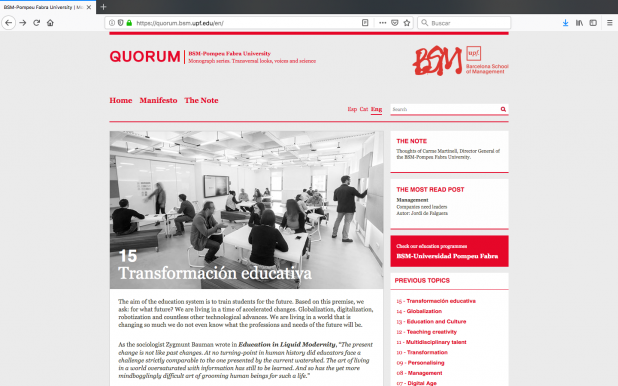I do not know of any good educational centre that does not have good teachers. It is increasingly clear to me that what makes a university, secondary school or primary school good or bad is its teachers. There is a direct relationship between the type of teachers who work there and the academic results, social prestige and satisfaction of your centre’s customers. Teachers are the core of education systems; they are what makes them good or bad. Therefore, there are no good or bad schools or universities; there are schools or universities with good or bad teachers. A centre with good teachers will always be a good centre. Ignoring this normally needs to mediocrity.
When I started working at the university, 25 years ago, I remember they told me that it had two basic aims: to create the professionals (and people, let us never forget) who are to manage/govern our future and to produce the RDI that will allow us to keep progressing as a society. Everything had to converge in this twofold objective. Teaching systems, facilities, the location and the management models were thus configured as tools to promote this twin purpose. It was very clear to me: neither of them is a purpose in itself; they are facilitators. We cannot make them the core of models and all too often they are.
The core of an educational model is the teachers and whether centres go well or badly depends largely on them. There are other factors we cannot ignore, obviously. But it is no good losing sight of the most important aspect. Therefore, if the key is to have good teachers, we should ask ourselves, “What is a good teacher?” and “What can we do to have the best teachers?” I would like to share some of the considerations that I see as essential in answering these questions:
- Although it seems obvious, one of the most important aspects in making this work is never forgetting, always having clear in your mind, what the core of any education system is. Reforms to education systems have all too often neglected teaching and staff. They have been based on other aspects (the model, research, qualifications, etc.) which, while important, are not the system’s core.
- Being demanding of teachers. The statement I am making is never based on complacency; I express it as a demand. Quality systems have been created that are normally endogamous and bureaucratic. It is necessary to generate the conditions for the teacher to constantly improve and be continually trained. In a world as dynamic as ours, teaching classes in the same way as they were taught five years ago must be a mistake. We must convince people of the vital need for innovation in classes.
- We should reward those who constantly place students in the pedagogical discomfort that generates learning and constant management of error as a stage leading to success. Universities reward research, pedagogical systems, good practices, etc. And that is all well and good. But what about the teachers?
- Orienting teaching towards diversity and organic systems. The learning of the past was based on uniformity (we are all the same and have the same abilities) and linearity (when we reach a certain point, we have all had the same experiences in the same order). But this is not only misleading, it is also impoverishing. We all have different talents and that is the great wealth of our society. You learn more from people with talents different to your own than from clones who repeat your vision of things. We need to constantly interact with people different to us. Why is there not more contact between students from different disciplines? The world is diverse and tends to be organic and teaching must embrace that.
- It is essential to supervise the message given in classrooms and ensure that the values that spring from it are those that we need as a society. Classrooms seem to be confessionals from remote times in which nothing could be made public. In some classrooms I have heard the silliest of things that will never be questioned even by the system’s managers or deans based on academic freedom. But please, we are in the 21st century!
- Allowing teaching staff their position of social leadership. If we believe that they are training those who are to govern our future, their role in the media, in politics and in the social fabric is too limited. We have to place teachers in a more relevant place in the system of mass transmission of values.
- Making them the core of any education system; not only in its design (I have seen educational reform committees without a single practising teacher) but also in its maintenance and evolution. The education system must be based on teachers, just as football is based on footballers. Should there be others involved? Of course. Teachers cannot do their work alone.
- It is necessary to relieve staff of the concern to defend their employment rights; these must be guaranteed right from the start. The education system should not be so unionized! We have to create the necessary conditions so a teacher does not spend so many hours concerned about whether or not he or she is working the necessary hours, will receive a bonus or will move up a pay grade. Do we not think teachers are one of the foundations of our future? Then let us treat them as such.
A teacher is not merely a transmitter of content; that is in the past. A teacher provokes, guides, stimulates, facilitates, is a creative, disruptive person, a mentor … in other words, a teacher is a motivator who forms the future of societies. Let us create education systems that allow that.
In QUORUM BSM-Pompeu Fabra University
https://quorum.bsm.upf.edu/en/temas/los-profesores-son-el-eje-central-de-los-modelos-educativos/

Comments are closed.